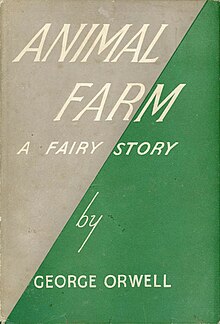
Back Animal Farm Afrikaans Rebelión en torre animal AN مزرعة الحيوان Arabic Heyvanıstan Azerbaijani حئیوانلار قالاسی AZB Ферма (аповесць) Byelorussian Фермата на животните (роман) Bulgarian অ্যানিম্যাল ফার্ম Bengali/Bangla Kêr al loened Breton Životinjska farma BS
 First edition cover | |
| Author | George Orwell |
|---|---|
| Original title | Animal Farm: A Fairy Story |
| Language | English |
| Genre | Political satire |
| Published | 17 August 1945 (Secker and Warburg, London, England) |
| Publication place | United Kingdom |
| Media type | Print (hard & paperback) |
| Pages | 92 |
| Awards | Modern Library's 100 Best Novels
NPR: 100 Best Science Fiction and Fantasy Books Hugo Award for Best Short Novel (1946) Prometheus Award – Hall of Fame (2011) |
| OCLC | 3655473 |
| 823/.912 20 | |
| LC Class | PZ3.O793 An |
| Preceded by | Inside the Whale and Other Essays |
| Followed by | Nineteen Eighty-Four |
Animal Farm is a satirical allegorical novella, in the form of a beast fable,[1] by George Orwell, first published in England on 17 August 1945.[2][3] It tells the story of a group of anthropomorphic farm animals who rebel against their human farmer, hoping to create a society where the animals can be equal, free, and happy. Ultimately, the rebellion is betrayed, and under the dictatorship of a pig named Napoleon, the farm ends up in a state far worse than before.
According to Orwell, Animal Farm reflects events leading up to the Russian Revolution of 1917 and then on into the Stalinist era of the Soviet Union, a period when Russia lived under the communist ideology of Joseph Stalin.[1][4] Orwell, a democratic socialist,[5] was a critic of Stalin and hostile to Moscow-directed Stalinism, an attitude that was critically shaped by his experiences during the Barcelona May Days conflicts between the POUM and Stalinist forces, during the Spanish Civil War.[6][a] In a letter to Yvonne Davet, Orwell described Animal Farm as a satirical tale against Stalin ("un conte satirique contre Staline"),[7] and in his essay, "Why I Write" (1946), wrote: "Animal Farm was the first book in which I tried, with full consciousness of what I was doing, to fuse political purpose and artistic purpose into one whole".[8]
The original title of the novel was Animal Farm: A Fairy Story, but US publishers dropped the subtitle when it was published in 1946, and only one of the translations, during Orwell's lifetime, the Telugu version, kept it. Other title variations include subtitles like "A Satire" and "A Contemporary Satire".[7] Orwell suggested the title Union des républiques socialistes animales for the French translation, which abbreviates to URSA, the Latin word for "bear", a symbol of Russia. It also played on the French name of the Soviet Union, Union des républiques socialistes soviétiques.[7]
Orwell wrote the book between November 1943 and February 1944, when the United Kingdom was in its wartime alliance with the Soviet Union against Nazi Germany and the British intelligentsia held Stalin in high esteem, a phenomenon Orwell hated.[b] The manuscript was initially rejected by several British and American publishers,[9] including one of Orwell's own, Victor Gollancz, which delayed its publication.[c] It became a great commercial success when it did appear, as international relations and public opinion were transformed as the wartime alliance gave way to the Cold War.[10]
Time magazine chose the book as one of the 100 best English-language novels (1923 to 2005);[11] it also featured at number 31 on the Modern Library List of Best 20th-Century Novels,[12] and number 46 on the BBC's The Big Read poll.[13] It won a Retrospective Hugo Award in 1996[14] and is included in the Great Books of the Western World selection.[15]
- ^ a b Meija 2002.
- ^ Bynum 2012.
- ^ 12 Things You 2015.
- ^ Gcse English Literature.
- ^ Orwell 2014, p. 23.
- ^ Bowker 2013, p. 235.
- ^ a b c Davison 2000.
- ^ Orwell 2014, p. 10.
- ^ Animal Farm: Sixty.
- ^ Dickstein 2007, p. 134.
- ^ Grossman & Lacayo 2005.
- ^ Modern Library 1998.
- ^ "The Big Read". BBC. April 2003. Retrieved 22 March 2020.
- ^ The Hugo Awards 1996.
- ^ "Great Books of the Western World as Free eBooks". Prodigal no more. 5 March 2019 – via WordPress.
Cite error: There are <ref group=lower-alpha> tags or {{efn}} templates on this page, but the references will not show without a {{reflist|group=lower-alpha}} template or {{notelist}} template (see the help page).